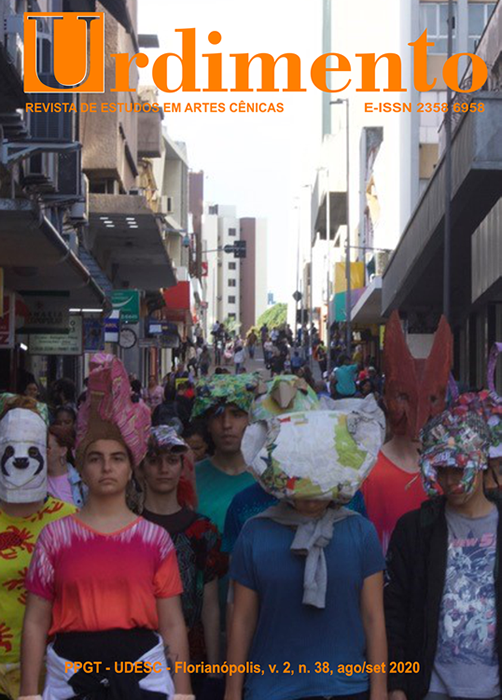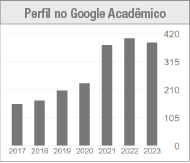Um “Transplante Dramatúrgico”: uma tradução comentada de La Mandragola de Maquiavel
DOI:
https://doi.org/10.5965/14145731023820200029Palavras-chave:
Tradução, Teatro, Nicolau MaquiavelResumo
Este ensaio é o relato de uma tradução comentada da comédia La Mandragola, do intelectual renascentista Nicolau Maquiavel, adaptada ao contexto contemporâneo da cidade de Salvador. O procedimento de tradução e sua análise permitiram, em primeiro lugar, evidenciar a importância de um estudo cuidadoso do vocabulário renascentista de cunho sexual para a recriação, no texto de chegada, dos duplos sentidos presentes no texto de partida, estudo viável graças às pesquisas de Valter Boggione (2016), que destacam, também, questões políticas e sociais presentes na peça. Em segundo lugar, com o auxílio dos estudos de Hannah Pitkin (2013), foi possível indicar algumas questões de gênero na peça maquiaveliana, in primis o papel da mulher. Desafios práticos da tradução, entre os quais a linguagem dos personagens, as características híbridas de um texto que contém prosa e poesia, e a distância histórica e geográfica entre a cultura do texto de partida e a do texto de chegada, foram postos em evidência e abordados mediante os procedimentos técnicos de tradução – em particular, o conceito de adaptação – sistematizados por Heloísa Gonçalves Barbosa (2004). Enfim, os autores introduziram o conceito de “transplante dramatúrgico”, transferência que se concretiza na cultura de chegada e que, ao mesmo tempo, revitaliza a cultura de partida, provocando, além do deslocamento do texto, o deslocamento do próprio tradutor.
Downloads
Referências
AUBERT, Francis Henrik. Desafios da tradução cultural (as aventuras tradutórias do Askeladden). TradTerm, São Paulo, v. 2, p. 31-44, 1995.
BARBOSA, Heloísa Gonçalves. Proposta de caracterização dos procedimentos técnicos da tradução. In: BARBOSA, Heloísa Gonçalves. Procedimentos Técnicos da Tradução. Campinas: Pontes, 2004. p. 63-77.
BOGGIONE, Valter. Le parole amorose: Mandragola, Clizia, Morgante. Venezia: Marsilio Editori, 2016.
CAMPOS, Haroldo de. Da razão antropofágica: a Europa sob o signo da devoração. Colóquio/Letras, Lisboa, n. 62, p. 10-25, jul. 1981.
DIONISOTTI, Carlo. Appunti sulla “Mandragola”. Belfagor, Firenze, n. 4, p. 621-644, 1984. Apud. BOGGIONE, Valter. Le parole amorose: Mandragola, Clizia, Morgante. Venezia: Marsilio Editori, 2016.
FONNESU, Daniel. Um “transplante dramatúrgico”: tradução comentada de La Mandragola de Maquiavel. 2018. Trabalho de Conclusão de Curso (TCC) – Universidade Federal da Bahia, Salvador, 2018.
GENTZLER, Edwin. Desconstrução. In: GENTZLER, Edwin. Teorias contemporâneas da tradução. Trad. Marcos Malvezzi. 2 ed. São Paulo: Madras, 2009.
IUMATTI, Paulo Teixeira. História e folhetos de cordel no Brasil: caminhos para a continuidade de um diálogo interdisciplinar. Escritural – Écritures d'Amérique latine, Poitiers, n. 6, p. 3-32, dez. 2012.
JAKOBSON, Roman. Os aspectos linguísticos da tradução. 20.ed. In: Linguística e comunicação. São Paulo: Cultrix, 1995.
MACHIAVELLI, Niccolò. La Mandragola. Torino: Einaudi, 1964.
MACHIAVELLI, Niccolò. Discorso o dialogo intorno alla nostra lingua. In:
MACHIAVELLI, Niccolò. Tutte le opere. Firenze: Sansoni Editore, 1971, p. 923-930.
MAQUIAVEL, Nicolau. A Mandrágora. Tradução de Pedro Garcez Ghirardi. São Paulo: Brasiliense, 1987.
MAQUIAVEL, Nicolau. A Mandrágora. Tradução de Mário da Silva. São Paulo: Editora Peixoto Neto, 2004.
MAQUIAVEL, Nicolau. Belfagor, o Arquidiabo – A Mandrágora. Tradução de Ciro Mioranza. São Paulo: Editora Escala, 2007.
MAQUIAVEL, Nicolau. A Mandrágora – Belfagor, o Arquidiabo. Tradução de Pietro Nassetti. São Paulo: Martin Claret, 2008.
MARTELLI, Mario. Machiavelli politico amante poeta. Interpres, Roma, n. 17, p. 211-256, 1998. Apud. BOGGIONE, Valter. Le parole amorose: Mandragola, Clizia, Morgante. Venezia: Marsilio Editori, 2016.
PITKIN, Hannah. Gênero e política no pensamento de Maquiavel. Revista Brasileira de Ciência Política, Brasília-DF, n. 12, p. 219-252, 2013.
PYM, Anthony. Explorando teorias da tradução. São Paulo: Perspectiva, 2017.
SCHLEIERMACHER, Friedrich E. D. Sobre os diferentes métodos de traduzir. Tradução de Celso Braida. Princípios: Revista de Filosofia, Natal, v. 14, n. 21, p. 233-265, 2007.
TRANSPLANTE. In: Dicionário Priberam da Língua Portuguesa. Disponível em:
<https://dicionario.priberam.org/transplante>. Acesso em: 23 jul. 2020a.
TRANSPLANTE. In: Michaelis Dicionário Brasileiro da Língua Portuguesa. Disponível em:
<http://michaelis.uol.com.br/busca?r=0&f=0&t=0&palavra=transplante>. Acesso em: 23 jul. 2020b.
STOPPELLI, Pasquale. La Mandragola e la commedia antica. In: STOPPELLI, Pasquale. La Mandragola: Storia e filologia. Roma: Bulzoni, 2005
VENUTI, Lawrence. The translator’s invisibility: a history of translation. London: Routledge, 1995.
VENUTI, Lawrence. A formação das identidades culturais. In: Escândalos da tradução. Bauru: EDUSC, 2002. p. 129-167.
Downloads
Publicado
Como Citar
Edição
Seção
Licença
Copyright (c) 2020 Urdimento - Revista de Estudos em Artes Cênicas

Este trabalho está licenciado sob uma licença Creative Commons Attribution 4.0 International License.
Declaração de Direito Autoral
Os leitores são livres para transferir, imprimir e utilizar os artigos publicados na Revista, desde que haja sempre menção explícita ao(s) autor (es) e à Urdimentoe que não haja qualquer alteração no trabalho original. Qualquer outro uso dos textos precisa ser aprovado pelo(s) autor (es) e pela Revista. Ao submeter um artigo à Urdimento e tê-lo aprovado os autores concordam em ceder, sem remuneração, os seguintes direitos à Revista: os direitos de primeira publicação e a permissão para que a Revista redistribua esse artigo e seus meta dados aos serviços de indexação e referência que seus editores julguem apropriados.
Este periódico utiliza uma Licença de Atribuição Creative Commons– (CC BY 4.0)




